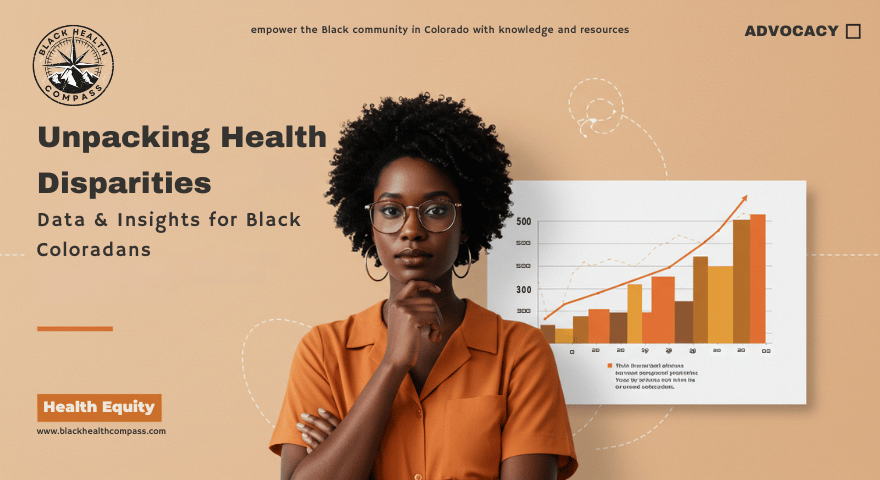Health Equity in Focus
Unpacking the reality of health disparities for Black Coloradans and the path toward a healthier, more equitable future.
The Coverage Gap
A higher percentage of Black Coloradans lack health insurance, creating a significant barrier to accessing preventative and necessary medical care.
Barriers to Care
Concerns about unfair treatment lead a notable portion of the community to skip needed medical care, highlighting a critical trust gap.
Kidney Disease Risk
Black Americans are
4x
more likely to develop end-stage kidney disease.
Diabetes and high blood pressure are the leading causes, making preventative care and management crucial.
The Root Causes: Beyond the Clinic
Health outcomes are shaped by more than just healthcare. Social and political factors create systemic barriers that profoundly impact the well-being of our community.
Systemic “Isms” & Policy
Historical policies and ongoing discrimination in areas like housing lead to environmental disparities, such as higher pollution in Black neighborhoods, which contributes to increased rates of conditions like asthma.
Access to Resources
Limited access to quality healthcare, healthy food (food deserts), safe housing, and transportation creates significant health challenges and financial strain.
Trust and Communication
A history of medical mistreatment and experiences of being dismissed by providers leads to a deep-seated mistrust, often causing delayed care and poorer health outcomes.
Empowerment Through Action: A Path Forward
Creating change requires a collective effort. Here’s how we can work together to build a healthier, more equitable future for Black Coloradans.
Individual Action
Prioritize your health with regular check-ups. Manage chronic conditions proactively and be prepared to discuss your needs honestly with your healthcare providers.
Community Action
Engage with local health organizations. Participate in health fairs, workshops, and advocacy efforts to support community-wide wellness and share trusted resources.
Policy Advocacy
Support leaders and policies that aim to dismantle systemic injustices, improve health equity, and ensure all Coloradans have access to quality, affordable care.
At Black Health Compass, our mission is to empower the Black community in Colorado with knowledge and resources to achieve optimal health. A crucial part of this empowerment involves understanding the landscape of health disparities that disproportionately affect us. It’s not just about individual choices; it’s about the broader social and political factors that shape our well-being.
As highlighted in the 2024 Colorado Black Health Resource Directory, and reinforced by discussions in our community focus groups, systemic issues play a significant role in health outcomes. Let’s dive into some key data and insights that underscore these challenges and illuminate the path forward.
The Reality: Health Disparities in Colorado’s Black Community
The data from the Colorado Department of Public Health and Environment (CDPHE) paints a clear picture:
- Health Insurance Coverage: While the overall average of uninsured adults (18-64) in Colorado is around 11.1%, 12.9% of Black/African Americans in Colorado lack health insurance coverage. This gap directly impacts access to preventative care and necessary treatments, as many of you shared in our focus groups about periods without insurance or struggles with affordability.
- Leading Causes of Death: Specific health conditions disproportionately affect Black Coloradans:
- Heart Disease & Hypertension: African Americans often experience higher rates of hypertension (high blood pressure) and related complications, contributing to a higher incidence of heart disease.
- Kidney Disease: This is a “silent killer,” with Black people being 4 times more likely to develop end-stage kidney disease than white Americans. Diabetes and high blood pressure are the top causes.
- Cancer: African American women, for example, face higher death rates from breast cancer despite lower incidence rates, highlighting disparities in diagnosis, treatment, or outcomes.
- Stroke: There’s a higher risk and often worse outcomes, partly due to elevated rates of hypertension and diabetes.
- Skipped Care Due to Unfair Treatment: A concerning statistic from the Colorado Health Institute reveals that 5.4% of Black/African American Coloradans skipped care due to concerns of being treated unfairly. This speaks directly to the critical need for culturally competent and trustworthy providers, a sentiment strongly echoed by many in our focus groups who emphasized the importance of feeling “comfortable,” “heard,” and “respected” by their doctors.
Beyond the Numbers: Social & Political Determinants of Health
The “Key to Improving Health” article in the directory rightly points out that non-medical factors—the social and political determinants of health—play the most significant role in our well-being. These are the conditions in which we are born, grow, live, work, and age.
- Systemic “Isms”: Racism, sexism, and other forms of systemic discrimination, whether intentional or unintentional, are often embedded in laws and decisions. These can disproportionately impact the health of communities of color. For instance, historical housing discrimination has led to Black communities living in areas with higher pollution, contributing to higher rates of conditions like asthma.
- Access to Resources: Factors like access to quality healthcare, healthy food (food deserts), safe housing, transportation, and employment opportunities directly influence health. Our focus groups highlighted the financial strain of healthcare costs and the need for accessible services.
- Trust and Communication: Historical abuses and ongoing experiences of being unheard or dismissed by healthcare providers contribute to a deep-seated mistrust. This can lead to delayed treatment and poorer outcomes, as shared by many who only seek care when issues are “forced.”
Empowerment Through Knowledge and Action
Understanding these disparities is the first step towards creating change. Black Health Compass is committed to providing you with the data you need to advocate for yourself, your family, and your community.
- Individual Action: Prioritize your health by seeking regular check-ups, managing chronic conditions, and exploring holistic practices that support your well-being. Be prepared to discuss your needs honestly with your healthcare providers.
- Community Action: Engage with organizations like the Colorado Black Health Collaborative, the Center for African American Health, and the Colorado Sickle Cell Association, who are actively working to address these disparities. Participate in health fairs, workshops, and advocacy efforts.
- Policy Advocacy: Support leaders and policies that aim to improve health equity, address systemic injustices, and ensure equitable access to quality care for all Coloradans.
By shining a light on these disparities and understanding their root causes, we can collectively work towards a healthier, more equitable future for Black Coloradans. Your health, your voice, your community – together, we can drive meaningful change.





